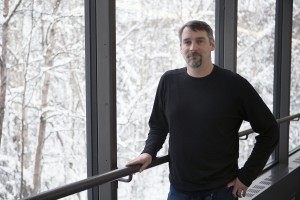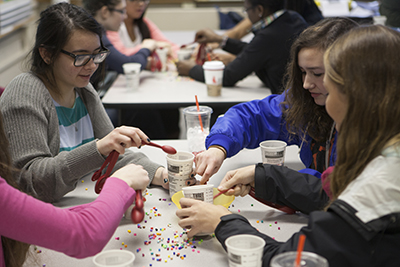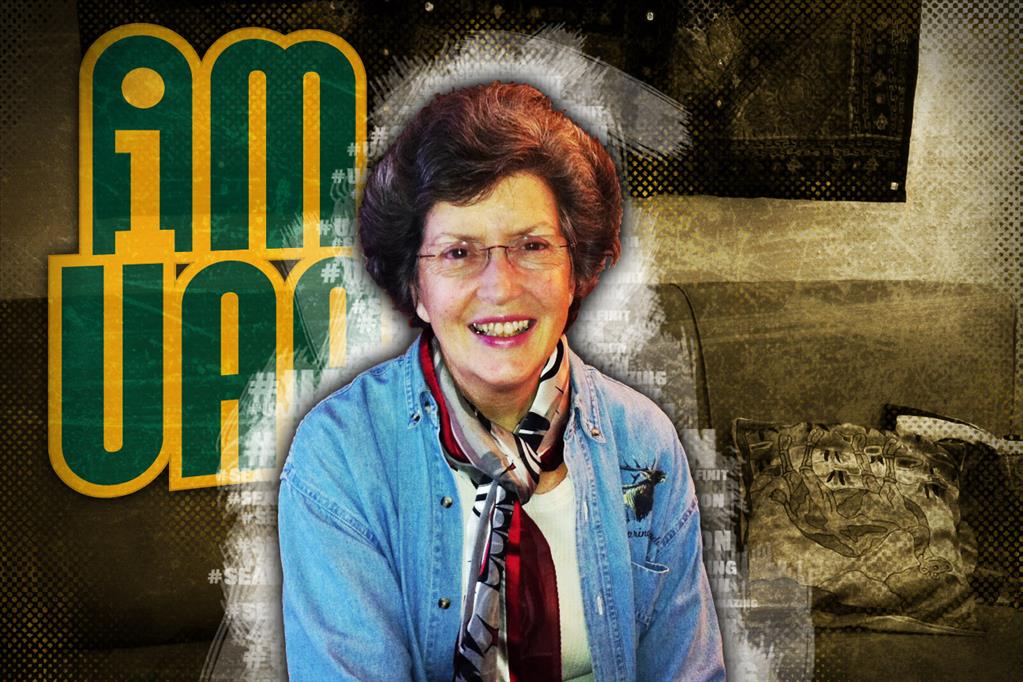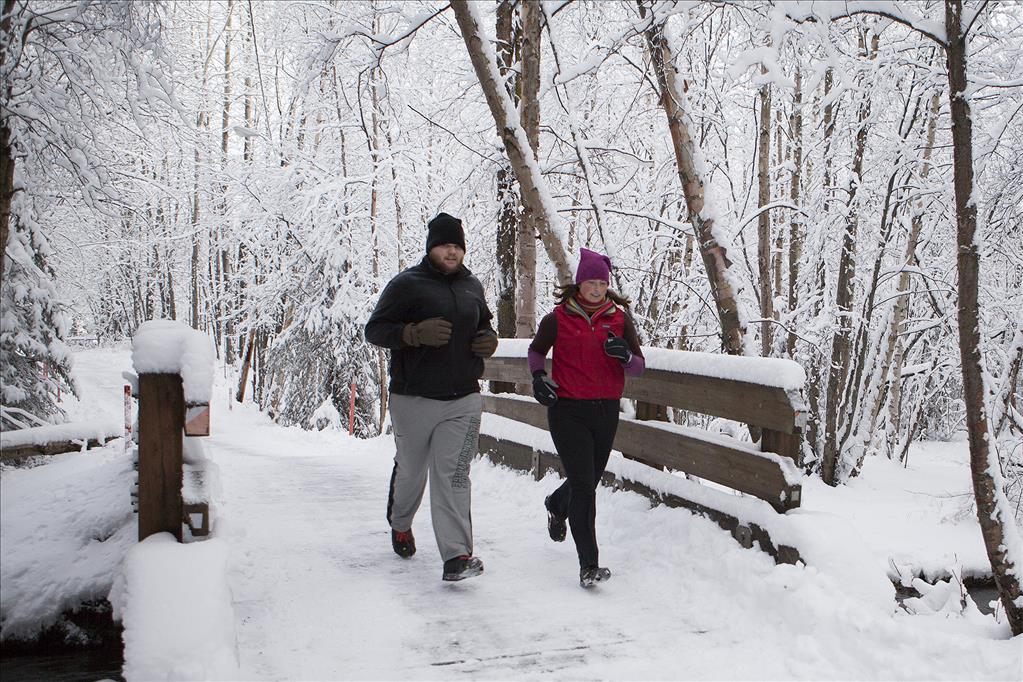Rasmuson Chair: A conversation with Todd Cherry
by Kathleen McCoy |
Todd Cherry is UAA's fourth Rasmuson Chair in Economics and 2013-14 marks the 10th anniversary for this unique academic opportunity at UAA. (See sidebar for details on previous Rasmuson Chairs.)
The Rasmuson Chair, established by the board of regents in late 2001, was created through a generous endowment by the late Elmer Rasmuson, an Alaska banker, entrepreneur and philanthropist.
In 2003, UAA welcomed Vernon Smith, a 2002 Nobel laureate in economics, as the first Rasmuson Chair. Smith served until 2006. Under his leadership, a new experimental research and teaching emphasis took shape at UAA.
Cherry comes to Alaska as an economics professor from Appalachian State University in North Carolina and as a senior research fellow at Oslo, Norway's Center for International Climate & Environmental Research. Cherry's research interests are broad, including environmental and natural resource economics, behavioral economics and game theory.
Recently, I invited him to talk informally about his research, what he'll do while he's here, and to help explain experimental economics to a general audience.
We met over coffee at Cuddy Hall.
Where do your ideas come from?
I am a little different from a lot of academics. Many are more focused on a specific research agenda. They know their area of research and the literature very well; they'll develop ideas from the literature and work to advance the literature.
I do that some, but what excites me often comes from observation from the real world. Early on in my career, I was listening to a news story talking about a referendum in California that would change its rules for voting in primaries. The political parties wanted the primaries closed so only members of the parties could vote in that primary; public advocates wanted it open.
Obviously that means the two different sides see different outcomes. And what we know from experimental economics is that if you change the rules, you get different outcomes.
One concern was that opening up the primary is the potential for strategic voting. You could have a person from one party voting in the other party's primary for the worst candidate, to sabotage the vote. That's negative strategic voting because it attempts to hurt the other party. But there's also a positive side to strategic voting. Maybe I like a more extreme candidate (Nader) but realize he will not win, so I vote for a more moderate candidate (Gore). That's considered positive strategic voting or a pragmatic vote.
My interest was driven by my curiosity of how the different rules would lead to different outcomes, and how prevalent strategic voting is. All of that came from hearing about this one news story.
You've spent a good deal of time in Norway, an oil-rich country. Now you're in Alaska. What comparisons do you see?
That's something that's interesting about this coming year and what attracted me to the position. Anchorage and Oslo are about at the same latitude and the northern part of Norway has many of the same environmental and development issues as Alaska. But they have very different policies and different approaches.
Can you help a layman understand what experimental economics is?
The experimental method is a tool or method to facilitate the process of uncovering insights and informing understanding. I find it interesting because I am interested in policy issues and how you set up the rules and incentives for policy.
A simple way to think about it is if a society or a market system is generating an outcome that you don't like, then you can change the rules of the game. The rules direct the outcomes. The method is useful for understanding how rules influence behavior and outcomes.
Also, this tool allows the testing of theories. If a theory predicts a behavioral response and outcome, you can design an experiment to directly test the theoretical predictions.
But in another setting, you might not have a theory at all. In this case, experiments allow you to explore uncharted ideas.
Experiments have allowed a lot of really precise and pointed tests of theory. We've been able to highlight shortcomings of theory and also identify some of its strengths. That's led some researchers to go back to the drawing board to compare what we see in the lab to what the theory predicts. That's given birth to behavioral economics, which is looking at how people's behavior systematically deviates from standard theories. In some cases, such understanding is important to policy design.
What are you working on?
One area that I'm currently working on relates to how people process risk and how they assess risk. It's one area we as humans are not particularly good at. If it will happen in the future, we tend to dismiss it more than we should. If it affects everyone as opposed to just me, we tend to treat it differently. You'd expect us to treat risk rationally, to weigh its benefits and costs, the probabilities. But how we actually assess risk doesn't always fall in line with rational choice models. This matters because many policies target risky problems, and the policy can be better by taking into account how people process risk.
There has been a lot written about how people will vote against their best interest. Is that part of this poor risk assessment?
Political science has done some interesting work at the intersection of economics and political science. They are looking at how policy is communicated to the public. We have answers to a lot of problems. We know the answers. Many political scientists and economists are looking at how to improve the prospects of implementing the solutions. We know what can be done but we have a hard time getting it done. Why? Taking into account what we know from various disciplines, in particular political science and psychology, the hope is to create processes that can be more effective and develop instruments that can be more politically feasible.
Give me an example.
There's some examples of people appearing to vote against policies that actually make them better off. States have had referendums to impose taxes on top earners and then use that money to fund schools and health care that will benefit the larger population. A transfer from a few to many. It failed. So it looks like they voted irrationally, but it is not at all clear because those opposed to the policy might believe the tax will hurt them in other ways. Hurt the economy, or one day in the future the tax will affect me.
This is a perfect opportunity for the experimental method because it allows you to control all of those confounding factors. In the lab, we set up the market that would generate more benefits to each person with a tax. Everyone did better with the tax, so there was no reason to vote against it. Many people voted against it anyway.
That raises potentially important questions. If people are voting against things that clearly make them better off, one goal for research is to understand how to overcome this barrier to progress.
Where's the bright side here?
We were intrigued by the congestion charge experience in Stockholm. There was discussion to institute a congestion charge - assess a fee for people who bring their car into the middle of the city to manage traffic problems.
People were mostly opposed to the charge, and polling indicated it would not pass a referendum. The policymakers took the approach to institute a trial run of the congestion charge. Their plan was to impose the charge for six months and then have a referendum on whether it would remain in place or be removed.
After people experienced the effects of the charge, many changed their minds and supported it. The charge passed the referendum, which was not predicted prior to the trial run. And support continues to increase; it's nearly 90 percent today.
Of course, this approach will not work in every situation. In this case, the effects from the policy were immediate and clear. With policies that provide more subtle effects, alternative approaches might help implementation of helpful policies.
Is trust, or lack of trust, at play here?
Trust certainly plays a role, but institutions get more of my attention. Recently, I've worked on global-scale challenges, such as pandemics, nuclear proliferation and climate change. Such challenges present issues of both trust and institutions. There are what we call social dilemmas at many levels, but global versions are particularly problematic due to sovereignty. Governments are able to help solve social dilemmas because they can impose solutions. Solutions do not have to be voluntary. At the global level, sovereign countries only agree to solutions voluntarily. Participation and contributions to a problem must be voluntary. That makes it difficult. The research questions revolve around how to create institutions that encourage and facilitate voluntary action. How do you get everyone on board?
What is your role at UAA?
I have interacted with lots of students, and I have been working with faculty on developing research ideas and even collaborating on proposals.
One of the main objectives is this cross-fertilization, the opportunity to provide some feedback on research. I brought in a few colleagues from North Carolina, Wyoming and Norway to share their research while also learning what is going on at UAA. Each of them also gave guest lectures to classes. I've tried to utilize my time at UAA to help continue the great work of previous Rasmuson Chairs and the Department of Economics.
Are you writing papers while you are here?
Yes. The opportunity to be here has afforded me an opportunity to focus on some of my existing research, but I'm also pursuing new ideas and projects with UAA faculty. I expect that even after my time at UAA ends, the personal and professional connections will remain with me for a long time.
 "Rasmuson Chair: A conversation with Todd Cherry" is licensed under a Creative Commons Attribution-NonCommercial 4.0 International License.
"Rasmuson Chair: A conversation with Todd Cherry" is licensed under a Creative Commons Attribution-NonCommercial 4.0 International License.















